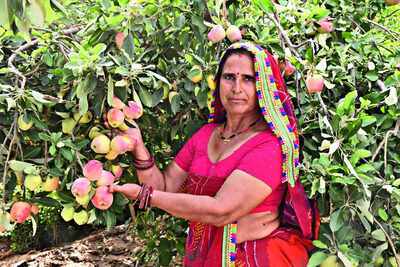JAIPUR: The Thar in Rajasthan stretches duney and dry. Summer season temperatures climb to a blistering 49°C. However the desert is altering. A fruit synonymous with the Himalayas has discovered an surprising dwelling on this sea of sand and scorching solar. Apples – pink and ripe. What appeared unimaginable is now a flourishing actuality for farmers in Sikar and Jhunjhunu districts, defying typical knowledge concerning the fruit’s want for cool climates.
Santosh Khedar, a farmer from Beri village in Sikar, by no means imagined her small experiment would flip right into a profitable apple orchard. A single sapling given to her in 2015 by Nationwide Innovation Basis in Gujarat has multiplied right into a thriving apple farm yielding greater than 6,000kg of fruit every season.
“Since we’ve a certificates of natural farming from Rajasthan Natural Certification Company, if the market worth for apples from Himachal and Kashmir is Rs 100 a kg, we’re promoting it at Rs 150/kg,” mentioned Santosh’s son Rahul, who studied agriculture, decided to make sure the household farm continued to thrive.
The household had lengthy grown lemon, guava, and candy lime on their 1.25-acre farm, however an apple tree appeared like a fantasy. “We have been initially sceptical,” Santosh mentioned. “We watered the plant and used natural fertilisers as wanted. A yr later, we noticed apples rising on it.”
Her neighbours laughed on the thought. Apples? Right here? They shook their heads on the thought. However Santosh’s tree didn’t care for his or her disbelief. In its second yr, it bore almost 40kg of fruit.
The key to this surprising success lies within the HRMN-99 apple selection, particularly developed to resist excessive temperatures. “This selection can develop in arid areas the place summer time temperatures exceed 40°C,” Rahul mentioned. Inspired by the outcomes, Santosh and her household acquired extra saplings and used grafting strategies to increase their orchard to 100 timber. “Ab to paani bhi koni laage jyada (Now, we barely want additional water),” she mentioned.
Apple timber require minimal irrigation as soon as they mature. “By the point the plant is 5 years previous, it solely wants watering as soon as each two weeks,” deputy director of horticulture Madan Lal Jat mentioned. “Flowering begins in Feb and the apples are prepared for harvest by June.”
Those that as soon as scoffed at Santosh at the moment are wanting to observe in her footsteps. “Jo manya konya ve ib podho maange hai,” she mentioned in her native dialect, which means: “Those that did not consider now ask for a sapling.” In close by Katrathal village, farmer Mohit Chaudhary has cultivated 50 apple timber. Horticulture official Jat sees a rising pattern. “Ten years in the past, individuals in Barmer cultivated dates and pomegranates. Now, we’ve farmers rising strawberries in Chittorgarh and Bhilwara,” he mentioned. “In 5 years, apple farming might unfold throughout extra areas,” he mentioned.
var _mfq = window._mfq || [];
_mfq.push([“setVariable”, “toi_titan”, window.location.href]);
!(function(f, b, e, v, n, t, s) {
function loadFBEvents(isFBCampaignActive) {
if (!isFBCampaignActive) {
return;
}
(function(f, b, e, v, n, t, s) {
if (f.fbq) return;
n = f.fbq = function() {
n.callMethod ? n.callMethod(…arguments) : n.queue.push(arguments);
};
if (!f._fbq) f._fbq = n;
n.push = n;
n.loaded = !0;
n.version = ‘2.0’;
n.queue = [];
t = b.createElement(e);
t.async = !0;
t.defer = !0;
t.src = v;
s = b.getElementsByTagName(e)[0];
s.parentNode.insertBefore(t, s);
})(f, b, e, ‘https://connect.facebook.net/en_US/fbevents.js’, n, t, s);
fbq(‘init’, ‘593671331875494’);
fbq(‘track’, ‘PageView’);
};
function loadGtagEvents(isGoogleCampaignActive) {
if (!isGoogleCampaignActive) {
return;
}
var id = document.getElementById(‘toi-plus-google-campaign’);
if (id) {
return;
}
(function(f, b, e, v, n, t, s) {
t = b.createElement(e);
t.async = !0;
t.defer = !0;
t.src = v;
t.id = ‘toi-plus-google-campaign’;
s = b.getElementsByTagName(e)[0];
s.parentNode.insertBefore(t, s);
})(f, b, e, ‘https://www.googletagmanager.com/gtag/js?id=AW-877820074’, n, t, s);
};
function loadSurvicateJs(allowedSurvicateSections = []){
const section = window.location.pathname.split(‘/’)[1]
const isHomePageAllowed = window.location.pathname === ‘/’ && allowedSurvicateSections.includes(‘homepage’)
if(allowedSurvicateSections.includes(section) || isHomePageAllowed){
(function(w) {
function setAttributes() {
var prime_user_status = window.isPrime ? ‘paid’ : ‘free’ ;
w._sva.setVisitorTraits({
toi_user_subscription_status : prime_user_status
});
}
if (w._sva && w._sva.setVisitorTraits) {
setAttributes();
} else {
w.addEventListener(“SurvicateReady”, setAttributes);
}
var s = document.createElement(‘script’);
s.src=”https://survey.survicate.com/workspaces/0be6ae9845d14a7c8ff08a7a00bd9b21/web_surveys.js”;
s.async = true;
var e = document.getElementsByTagName(‘script’)[0];
e.parentNode.insertBefore(s, e);
})(window);
}
}
window.TimesApps = window.TimesApps || {};
var TimesApps = window.TimesApps;
TimesApps.toiPlusEvents = function(config) {
var isConfigAvailable = “toiplus_site_settings” in f && “isFBCampaignActive” in f.toiplus_site_settings && “isGoogleCampaignActive” in f.toiplus_site_settings;
var isPrimeUser = window.isPrime;
var isPrimeUserLayout = window.isPrimeUserLayout;
if (isConfigAvailable && !isPrimeUser) {
loadGtagEvents(f.toiplus_site_settings.isGoogleCampaignActive);
loadFBEvents(f.toiplus_site_settings.isFBCampaignActive);
loadSurvicateJs(f.toiplus_site_settings.allowedSurvicateSections);
} else {
var JarvisUrl=”https://jarvis.indiatimes.com/v1/feeds/toi_plus/site_settings/643526e21443833f0c454615?db_env=published”;
window.getFromClient(JarvisUrl, function(config){
if (config) {
const allowedSectionSuricate = (isPrimeUserLayout) ? config?.allowedSurvicatePrimeSections : config?.allowedSurvicateSections
loadGtagEvents(config?.isGoogleCampaignActive);
loadFBEvents(config?.isFBCampaignActive);
loadSurvicateJs(allowedSectionSuricate);
}
})
}
};
})(
window,
document,
‘script’,
);

